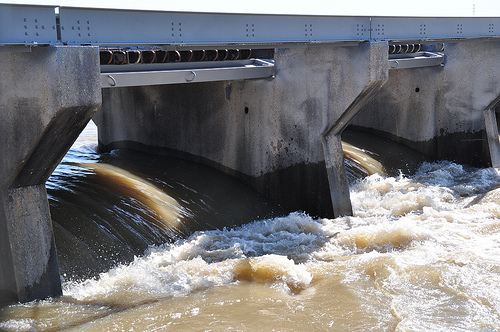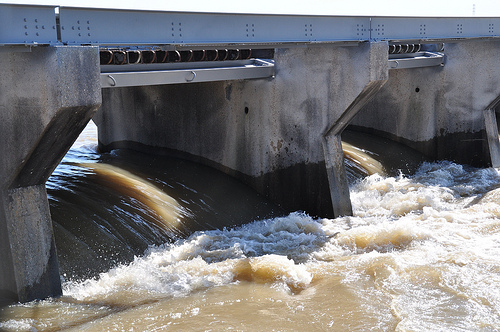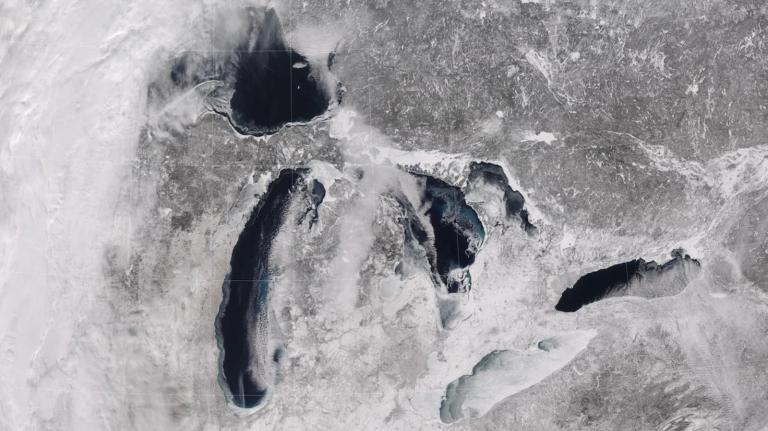 They’ve literally opened the floodgates.Photo: Gulf Restoration NetworkCross-posted from the Wonk Room.
They’ve literally opened the floodgates.Photo: Gulf Restoration NetworkCross-posted from the Wonk Room.
“Flooding along the Mississippi River has set a new water level record,” according to the National Weather Service. “The massive flood churning its way down the Mississippi River will go down in history for its catastrophic, multi-billion dollar impact on the Midwestern economy.” USA Today reported that “losses in Arkansas are estimated at more than $500 million, according to the state Farm Bureau. In Memphis, where the river crested Tuesday, damage was estimated at $320 million. Agricultural losses in Mississippi, including grain and catfish farms, could hit $800 million.”
The catastrophic flood, which is now forcing the U.S. Army Corps of Engineers to flood thousands of acres of Louisiana in order to protect Baton Rouge and New Orleans, is primarily the result of record rainfall in the Mississippi watershed. Record amounts of precipitation fell in the central United States from February to April, with record April rains in Illinois, Indiana, Kentucky, Ohio, West Virginia, and Pennsylvania.
This is precisely what scientists have warned would come about as greenhouse pollution warms the air and oceans, and industrial agriculture worsens runoff [PDF]. In 1999, scientists found a clear trend of increased flooding [PDF] of the Mississippi River basin because of increasing precipitation. In 2000, the federal government’s Climate Assessment warned that “the projected increase in very heavy precipitation events [PDF] will likely lead to increased flash flooding and worsen agricultural and other non-point source pollution as more frequent heavy rains wash pollutants into rivers and lakes,” citing the catastrophic 1993 flood of the Mississippi River as an example. The federal government’s 2009 climate assessment report warned that greenhouse pollution will cause “more frequent flooding” [PDF] in the Midwest, including the Mississippi River. The EPA endangerment finding, which most of the politicians in Mississippi basin voted to overturn, similarly warned of “greater flood risk” [PDF]:
The Midwest has experienced two record-breaking floods in the past 15 years, and this trend is expected to continue given projected future increases in winter and spring precipitation combined with greater frequency of heavy downpours. More frequent flooding is likely to cause increased property damage, insurance rates, emergency management costs, and clean-up and rebuilding costs.
One study expects flooding in the upper Mississippi basin to be 50 percent greater [PDF] by the 2040s, an estimate that may turn out to be unfortunately conservative. Flood frequencies calculated by the U.S. Army Corps of Engineers based on the assumption of a stable climate have been shattered in recent decades, scientists have found:
The record stage set in 1993 exceeded the calculated 500-year level, whereas 2008 was a 200-year event. In addition, 2001 suffered a 50- to 100-year flood, 1986 and 1996 experienced 25- to 50-year floods, and five more years had 10-to 25-year floods.
The states suffering from the flooding are represented by politicians who have voted to disregard the threat of a polluted climate system:
Arkansas: All six members of the Arkansas congressional delegation voted in April to block the Environmental Protection Agency from enforcing greenhouse pollution rules.
Louisiana: Eight out of nine members of the Louisiana congressional delegation, including both senators, voted in April to block the Environmental Protection Agency from enforcing greenhouse pollution rules.
Mississippi: Five out of six members of the Mississippi congressional delegation, including both senators, voted in April to block the Environmental Protection Agency from enforcing greenhouse pollution rules.
Missouri: Nine out of 11 members of the Missouri congressional delegation, including both senators, voted in April to block the Environmental Protection Agency from enforcing greenhouse pollution rules.
Tennessee: Nine out of 11 members of the Tennessee congressional delegation, including both senators, voted in April to block the Environmental Protection Agency from enforcing greenhouse pollution rules.
Not only are the congressional delegations of the flooded states willfully trying to protect the polluters of our dangerous climate system, but their anti-science austerity measures are putting their constituents at even greater risk. While protecting corporate subsidies and millionaire tax cuts, they slashed funding in the 2010 continuing resolution for the National Oceanic and Atmospheric Administration (NOAA) and the United States Geological Service (USGS), who run our nation’s weather forecasting satellites and river gauge system.
The budget cuts to NOAA have put crucial weather satellites on the chopping block, which will lead to “flood forecast error,” NOAA warns. The USGS cuts mean that river gauges throughout the nation are being shut down after nearly a hundred years of continuous monitoring. Again, “flood forecasting will be much less accurate without the gauges.”



